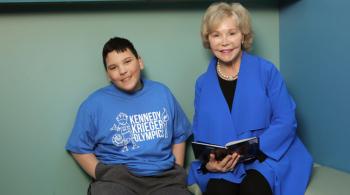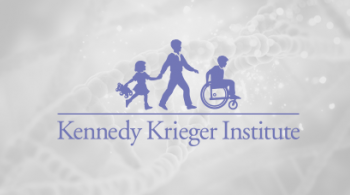By Tracy Waller, Esq., MPH, MCDD staff attorney

This blog post was first published by the Center for Dignity in Healthcare for People with Disabilities (CDHPD) on January 26, 2022.
As a result of the COVID-19 public health crisis, children are being forced to shoulder an incomprehensible burden of loss. Many children have experienced health issues due to COVID-19 infections or long COVID-19 symptoms. They have also encountered a loss of innocence and protection, as they shoulder the weight of a parent coping with long COVID-19—or worse, the death of a parent or primary caregiver from COVID-19. This loss disproportionately affects young children and children with developmental disabilities because of the increased reliance on their caregivers.
The Impact on Children
It is a misapprehension to think that children have largely been spared in the COVID-19 pandemic. Early in the pandemic, news outlets reported that children were “spared” because they were less likely to become infected, sick or hospitalized, or die. However, that framing, focusing only on the direct effect to the child of a viral illness, failed to contextualize the multiple adverse impacts that “indirect” effects of the pandemic have had on children.
The Loss of Caregivers
For every four COVID-19 deaths, one child has lost a parent (or grandparent or other caregiver). When “COVID-19–Associated Orphanhood and Caregiver Death in the United States” was published in Pediatrics on October 7, 2021, the authors estimated that more than 140,000 U.S. children had lost a primary or secondary caregiver due to the COVID-19 pandemic. As of January 21, 2022, 847,666 people ages 18 years and older have died from COVID-19. Today, the number of U.S. children that have lost a primary or secondary caregiver due to the COVID-19 pandemic likely stands higher than 211,000. In December 2021, Social Policy Analytics and COVID Collaborative released the publication “Hidden Pain: Children Who Lost a Parent or Caregiver to COVID-19 and What the Nation Can Do to Help Them.” Using a different statistic to highlight the same problem, that study estimates that roughly one in 450 children in the U.S. has lost at least one of their caregivers to COVID-19. Even more alarming, the study estimates that more than 13,000 children have lost their only in-home caregiver.
The Burden of Long COVID-19 and Caregivers
Studies have reached varying conclusions on the rates of long COVID-19, or symptoms that persist at least six months from the onset of the initial COVID-19 infection. In this study published on September 28, 2021, researchers found that 57% of COVID-19 survivors had one or more long COVID-19 symptoms over a six-month period after recovery. In this study published on October 13, 2021, researchers found that more than half of COVID-19 survivors experienced long COVID-19 six months after recovery. In this study published on November 16, 2021, researchers found that more than 40% of COVID-19 survivors worldwide have or had long-term effects.
The United States Centers for Disease Control and Prevention (CDC) estimates that 146.6 million people have been infected with COVID-19 (as of October 2, 2021). Based on U.S. population estimates, nearly half of Americans have had COVID-19. And based on the above studies, nearly half of people who have had COVID-19, or about 70 million people, will have or have had long COVID-19. In 2020, more than 18.6 million, or almost one-quarter of the 73 million U.S. children under the age of 18 years, live with one parent and no other adults.1 Based on the above estimates, approximately one-quarter of the 18.6 million children, or 4.65 million children, could be living with a parent with long COVID-19.2
About one in six—roughly 17%—of children ages 3 to 17 years old have one or more developmental disabilities. Assuming children with disabilities follow the same trend, then about one-quarter live with one parent and no other adults (approximately three million), and one-quarter of those adults will develop long COVID-19. Therefore, it is possible that as many as 790,000 children with one or more developmental disabilities will be living with a parent with long COVID-19. For young children and children with disabilities who rely on their caregivers, this loss can be insurmountable. Young children and children with disabilities rely on their caregivers to obtain services and supports that otherwise might not be available to them without an advocate.
Children: Poor Health Outcomes
Hospitals are reporting a surge in pediatric patients—to the highest level since the beginning of the pandemic. While many children may not become seriously ill or die at the same rates as adults, children with disabilities may have underlying health conditions that place them at a higher risk for becoming infected with and developing severe illness because of COVID-19. Children who recover from COVID-19 can still face lingering effects of COVID-19, even after a mild infection. Long COVID-19 symptoms in children mirror those in adults and include respiratory problems, cognitive defects, chronic fatigue, headaches, and loss of senses of smell or taste. Some children may develop another pediatric complication of COVID-19, such as multisystem inflammatory syndrome in children (MIS-C), “a condition where different body parts can become inflamed, including the heart, lungs, kidneys, brain, skin, eyes, or gastrointestinal organs.” Although it is rare, it progresses rapidly, and can occur in children who have had mild or asymptomatic cases of COVID-19.
In response to the growing number of children with long-term complications from COVID-19, many post-COVID-19 pediatric clinics began opening at health centers across the U.S., including the Pediatric Post-COVID-19 Rehabilitation Clinic at Kennedy Krieger Institute. Although the prevalence of long COVID-19 symptoms in children is not yet known (several studies have varied in their prevalence outcomes), in his interview on WYPR Midday on January 19, 2022, “On COVID & pediatric care: Kennedy Krieger CEO Dr. Bradley Schlaggar,” Dr. Schlaggar reiterated the importance of preventing COVID-19 in children because even if COVID-19 in children is mild initially, if it turns into a chronic illness, “that’s not a good tradeoff.”
Conclusion
Young children and children with developmental disabilities are disproportionately affected by the losses caused by the COVID-19 pandemic. Death or chronic illness of a caregiver is one of the overlooked burdens of the pandemic. While long COVID-19 may be recognized as a disability in some instances by the Office for Civil Rights, it is imperative that we also find a way to support the children affected by the illnesses and deaths of their primary and secondary caregivers due to COVID-19.
Special thanks to Dr. Bradley L. Schlaggar, president and CEO of Kennedy Krieger Institute, for his interest in the topics of loss of a caregiver and long COVID-19 in caregivers for children with neurodevelopmental disabilities, which were the impetus for this blog.
References
1Author’s note: This number is most certainly higher because it does not include children raised by grandparents, older siblings and caregivers not identifying as either a mother or a father.
2The number of children living in single-parent households is likely higher than the number of single parents, and therefore the estimates may be slightly off, but the author acknowledges that these are estimates.









